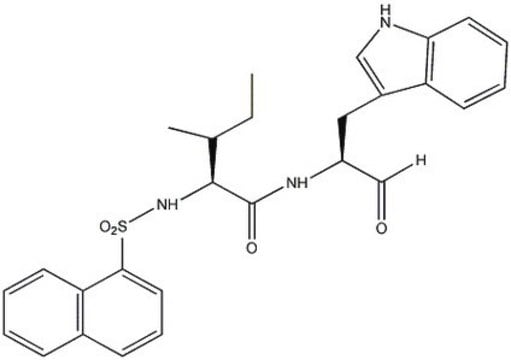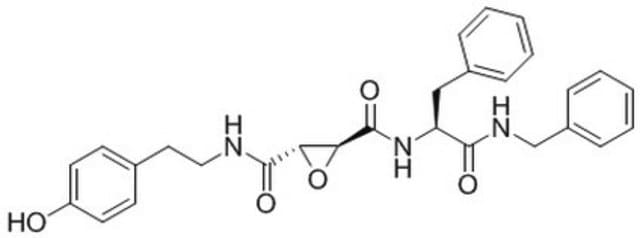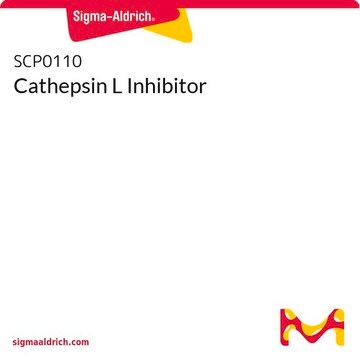219427
Cathepsin L Inhibitor III
The Cathepsin L Inhibitor III controls the biological activity of Cathepsin L. This small molecule/inhibitor is primarily used for Protease Inhibitors applications.
Synonym(s):
Cathepsin L Inhibitor III, Z-FY( t-Bu)-DMK, Z-FY(t-Bu)-DMK
Sign Into View Organizational & Contract Pricing
All Photos(1)
About This Item
Empirical Formula (Hill Notation):
C31H34N4O5
Molecular Weight:
542.63
UNSPSC Code:
12352200
NACRES:
NA.77
Recommended Products
Quality Level
Assay
≥98% (TLC)
form
solid
manufacturer/tradename
Calbiochem®
storage condition
OK to freeze
protect from light
color
white to light yellow
solubility
DMSO: 5 mg/mL
shipped in
ambient
storage temp.
−20°C
General description
An irreversible inhibitor of Cathepsin L (Cat. No. 219402). About 10,000-fold more effective against cathepsin L than cathepsin S.
An irreversible inhibitor of Cathepsin L (Cat. No. 219402). About 10,000-fold more effective against cathepsin L than cathepsin S.
Biochem/physiol Actions
Cell permeable: yes
Primary Target
Cathepsin L
Cathepsin L
Product does not compete with ATP.
Reversible: no
Warning
Toxicity: Standard Handling (A)
Sequence
Z-Phe-Tyr(t-Bu)-diazomethylketone
Reconstitution
Following reconstitution, aliquot and freeze (-20°C). Stock solutions are stable for up to 2 weeks at -20°C.
Other Notes
Shaw, E., et al. 1993. FEBS Lett. 334, 340.
Legal Information
CALBIOCHEM is a registered trademark of Merck KGaA, Darmstadt, Germany
Storage Class Code
11 - Combustible Solids
WGK
WGK 1
Flash Point(F)
Not applicable
Flash Point(C)
Not applicable
Certificates of Analysis (COA)
Search for Certificates of Analysis (COA) by entering the products Lot/Batch Number. Lot and Batch Numbers can be found on a product’s label following the words ‘Lot’ or ‘Batch’.
Already Own This Product?
Find documentation for the products that you have recently purchased in the Document Library.
Customers Also Viewed
Qi Feng Lin et al.
Journal of virology, 97(10), e0082823-e0082823 (2023-09-25)
Reoviruses infect many mammals and are widely studied as a model system for enteric viruses. However, most of our reovirus knowledge comes from laboratory strains maintained on immortalized L929 cells. Herein, we asked whether naturally circulating reoviruses possess the same
Yongmei Liu et al.
Journal of virology, 97(9), e0060123-e0060123 (2023-09-07)
Canine coronavirus-human pneumonia-2018 (CCoV-HuPn-2018) was recently isolated from a child with pneumonia. This novel human pathogen resulted from cross-species transmission of a canine coronavirus. It has been known that CCoV-HuPn-2018 uses aminopeptidase N (APN) from canines, felines, and porcines, but
Xiaoxun Li et al.
Theranostics, 11(20), 9821-9832 (2021-11-25)
Background: Bone metastasis is a frequent symptom of breast cancer and current targeted therapy has limited efficacy. Osteoclasts play critical roles to drive osteolysis and metastatic outgrowth of tumor cells in bone. Previously we identified CST6 as a secretory protein
Swetha Mohan et al.
Molecular neurodegeneration, 16(1), 51-51 (2021-08-05)
Progranulin loss-of-function mutations are linked to frontotemporal lobar degeneration with TDP-43 positive inclusions (FTLD-TDP-Pgrn). Progranulin (PGRN) is an intracellular and secreted pro-protein that is proteolytically cleaved into individual granulin peptides, which are increasingly thought to contribute to FTLD-TDP-Pgrn disease pathophysiology.
Cong Zeng et al.
bioRxiv : the preprint server for biology (2021-06-09)
Severe acute respiratory syndrome coronavirus 2 (SARS-CoV-2) is a highly transmissible coronavirus responsible for the global COVID-19 pandemic. Herein we provide evidence that SARS-CoV-2 spreads through cell-cell contact in cultures, mediated by the spike glycoprotein. SARS-CoV-2 spike is more efficient
Our team of scientists has experience in all areas of research including Life Science, Material Science, Chemical Synthesis, Chromatography, Analytical and many others.
Contact Technical Service









